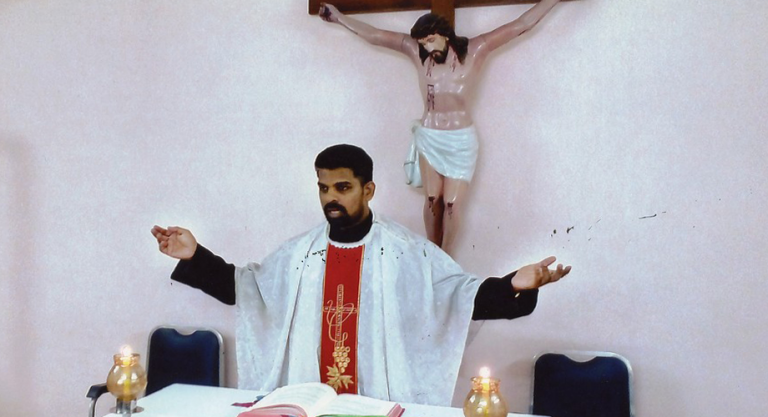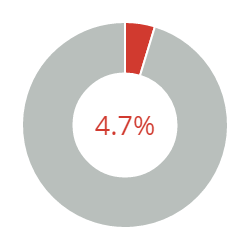Persecuted and Forgotten?
A report on Christians oppressed for their Faith 2015-17

KEY INDICATORS & FINDINGS
Christians have faced a rising wave of violence, with attacks drastically increasing since the March 2017 elections. 316 incidents were reported in the first five months of 2017.
STATISTICS |
PROFILE
Since the right-wing Bharatiya Janata Party (BJP) came to power in the April-May 2014 general election, Christians have faced a rising wave of violence. According to the report Indian Christian Persecution 2016, 365 anti-Christian incidents occurred over the course of the year, which included 10 people being killed and more than 500 members of the clergy or senior community members being attacked for their faith. The report by the Catholic Secular Forum also claimed that 394 Christians were detained or arrested, 145 were beaten, assaulted or manhandled, and 34 Christian women (including nuns) were raped or otherwise assaulted. Chhattisgarh State in central India, which was the scene of the worst persecution, has been ruled by the BJP since 2003.
Reports indicate that attacks against Christians have drastically increased since the March 2017 elections, which saw a landslide victory for the BJP – with the sharpest rises in incidents occurring in Uttar Pradesh and Telangana State. From January to May 2017 Open Doors reported a total of 316 incidents – almost as many as were recorded for the whole of 2016. Discrimination against Christians also increased throughout the period under consideration, with Hindu militants ensuring that Christians in several villages were denied access to rice, wheat, sugar and other food offered at subsidised rates under the 2013 National Food Security Act.
Evidence of increased persecution of Christians since Narendra Modi became India’s Prime Minister in May 2014 is noteworthy, especially given the religious-freedom rhetoric which has frequently characterised a number of his speeches, particularly abroad. On 8th June 2016, on his fourth visit to the United States, Mr Modi told a special joint session of Congress that religious liberty was central to India’s constitution. He said: “For my government, the constitution is a real holy book. And in that holy book, freedom of faith, speech and franchise and equality of citizens, regardless of background, are enshrined as fundamental rights.”
To a large extent, the cause of the growing persecution against Christians is the spread of Hindutva philosophy within society. Hindutva is a right-wing form of Hindu nationalism, which in essence regards India as a Hindu country which should not tolerate other religions or cultures. The ruling BJP strongly subscribes to this ideological approach and its political success is facilitating right-wing rhetoric. In February 2017 Mohan Bhagwat, head of the Rashtriya Swayamsevak Sangh (RSS) of which the BJP is the political arm, said: “India is a country only for Hindus.” However, this assertion was more nuanced than it might at first appear, as he asserted: “Every person living in India is Hindu, including Muslims, who are Hindus by nationality but Islamic by faith.”
The release in August 2015 of census data shows that for the first time since independence in 1947, Hindus dropped below 80 percent of the population. This data has stoked Hindutva fears that forced conversions are changing the face of India. Seven of India’s 29 states have adopted anti-conversion laws. In each case, anti-conversion laws, which punish conversions obtained by “force” or “fraudulent means”, are based on the notion of protecting “public order”, an area under state jurisdiction. Hindutva groups have held Ghar Wapsi (“home coming”) ceremonies. Reports suggest that (ironically, given their rhetoric against forced conversion) many of these events have involved the forcible re-conversion of Christians to Hinduism. According to Open Doors, “[Christian converts] are constantly under pressure to return to their old beliefs, and are often physically assaulted, sometimes killed.” Indeed, the concern over the forced conversion of Hindus has led to further verbal attacks on Mother Teresa. In June 2016 BJP politician Yogi Adityanath said that Mother Teresa was “part of a plot to convert India to Christianity”. Church leaders have repeatedly asserted that in the matter of conversions their record is beyond reproach. Archbishop Leo Cornelio of Bhopal stated that allegations of improper proselytism activities levelled against the Church were designed to sow division between faith communities, adding: “I want to ask all those who accuse us of converting gullible people to Christianity: ‘Where are those whom we converted?’”
The spectre of the Kandhamal attacks of Christmas 2007 and August 2008 still haunt the Christian community. Describing the extent of the anti-Christian violence, human-rights activist John Rebeka said: “Violence in Kandhamal severely affected women and children, obstructing the path of education. 600 villages were destroyed, 5,600 houses were looted, 295 churches and other places of worship, 13 schools, and homes for leprosy patients were destroyed. About 56,000 Christians of Kandhamal became homeless. The faithful were told that the condition in order to stay in that district was to become Hindus. This is the reality of the tragedy of Kandhamal.” There were positive developments over the period in question, when India’s Supreme Court ruled that the €273,000 allocated for reconstruction by the regional government of Kandhamal in 2011 is inadequate and ordered the state authorities to pay an additional sum of money. The Roman Catholic Church has taken steps to canonise those killed during the anti-Christian pogroms in the state. Archbishop John Barwa of Cuttack-Bhubaneswar has assembled a group of experts to gather information about the martyrs. He said: “Our men, women and children, who became martyrs because of their faith, are not forgotten… Even if they were killed in a horrible way, their death has brought a new life and a new faith.” He added: “The official launch of the process is ‘a big thing’ for Christians in India, especially for the challenges that the minority faces every day. It will serve to strengthen and revitalise the Christian community, affected by the attacks of 2008.”







